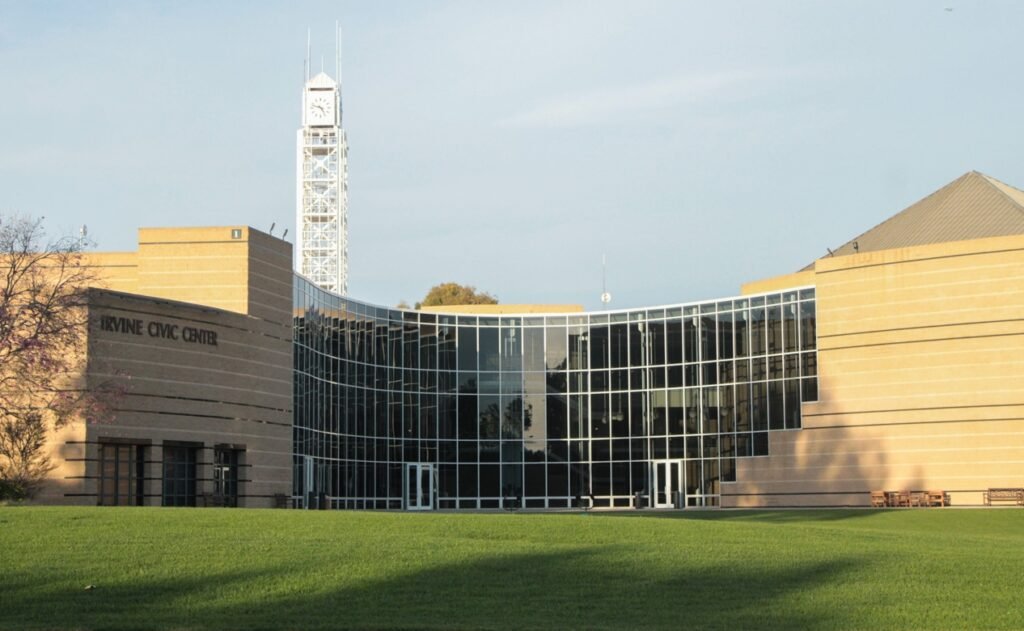Irvine City Council Delays Open Space Ballot Measure to 2026
On a humid Tuesday evening in Irvine, California, City Council members gathered to address an increasingly controversial topic: the fate of open space in a burgeoning metropolis that has seen its once-expansive landscapes whittled down by development. In a move that reflects both local complexities and state-level tensions, the Council decided to postpone discussions about a significant open space ballot measure, including the contentious potential transformation of the Oak Creek Golf Club into housing, until 2026.
Balancing Local Needs Against Statewide Developments
The decision stemmed from concerns that an upcoming statewide election to redraw congressional district boundaries could burden local voters. Mayor Larry Agran articulated this sentiment during the meeting, stating, “It seems patently ridiculous to ask the people of the city of Irvine to be involved in that statewide measure and then to vote again on a very important matter on Nov. 18 in a special election.”
A comprehensive analysis shows that Irvine has been in a slow but irreversible decline regarding green spaces, with only 14.6% of Irvine’s land area designated for parks and open spaces, far below the national average of 30%. Residents worry that converting any further land into development may irrevocably change the character of their community.
- Housing Development: A proposed 3,100 housing units at Oak Park, encompassing the golf course, has triggered widespread concern.
- Community Sentiment: Many residents urge preservation, citing the city’s 1988 initiative that protected the golf course as open space.
- Legal Implications: A law firm representing local homeowners claims an easement exists that requires the city to maintain the land as open space.
The Oak Creek Controversy
The future of Oak Creek Golf Club has become a flashpoint in this debate. Plans put forth by the Irvine Company seek to reimagine the beloved green into a residential village, which would include schools, parks, and multifamily housing. Yet, the 1988 voter-approved initiative stands as a formidable legal barrier against this transformation.
“If the council wants to remove the designation as preservation, then they must first obtain permission from the voters through a new ballot measure,” local environmental activist Paula Miller contended. The emotional weight of this issue is further amplified by a recent legal letter sent to the city’s Council from the Orange Tree Master Homeowners Association, compelling the city to act on easement agreements, which many believe would safeguard the golf course from development.
The Statewide Landscape
This local conflict is intricately connected to larger statewide issues. The council’s decision to delay not only reflects a prudent approach to managing public sentiment but is also a tactical retreat from a problematic overlap with impending state-level elections. “Delaying this until a meeting in January makes sense,” suggested Councilmember Kathleen Treseder.
This decision could also have broader implications for California’s political landscape, especially as Gov. Gavin Newsom proposes reducing Republican-leaning congressional districts, a move that echoes national debates on demographic shifts, gerrymandering, and electoral integrity.
Research from the California State University’s Institute for Public Policy indicates a direct connection between urban green space and social equity: neighborhoods with ample parks not only foster community but also lower crime rates and improve mental health outcomes. As cities grapple with housing shortages, the balance between development and preservation becomes even more critical.
Community Voices: Divided but Passionate
The exchange at the city council meeting was charged, with former Irvine Mayor Christina Shea providing testimony against the proposed ballot measures. “They’re in breach of contract. We have an attorney ready to file a lawsuit,” she asserted, echoing the sentiments of many who feel that the preservation of open space should take precedence over development.
Supporters of development argue that building more housing is essential to address California’s significant housing crisis. But members of the community vehemently disagree. “There’s no reason for this to go to the ballot,” Miller reasserted. “We already did it in ‘88.”
Community members expressed relieved gratitude for the postponement. “Thank you for continuing this item,” said Greg Smith, a former council member. “The added time will serve everybody well.” This sentiment resonates with stakeholders who prefer a more measured approach to a decision fraught with potential ramifications.
As discussions are postponed and legalities remain unresolved, the fate of Irvine’s green spaces hangs in the balance, risking a community fabric that many believe is worth protecting. With the next city council meeting set for January, residents keenly await word on a future that might just redefine the essence of their city.





